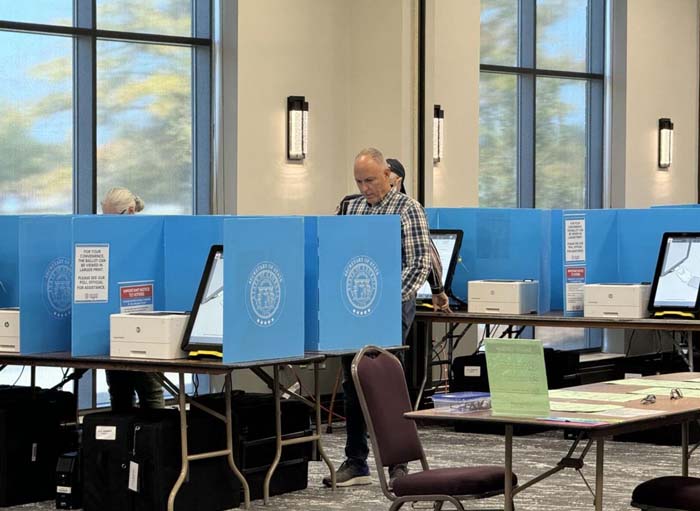Ahead of 2024 session, Raffensperger makes another push to end runoff elections
Published 10:41 am Thursday, December 21, 2023

- EXERCISING THEIR RIGHTS: Valdosta voters visit the Rainwater Conference Center’s designated polling location to cast their vote in the Nov. 7, 2023 municipal elections.
ATLANTA— Just weeks from the 2024 legislative session, Georgia Secretary of State Brad Raffensperger is calling on lawmakers to end runoff elections.
In Georgia primary elections, when a party’s candidate is chosen, and general elections, the top two vote-getters advance to a runoff when no candidate gets more than 50% of the votes. Louisiana and Mississippi also allow runoffs for general elections in certain races.
Most all other states allow a candidate to win an election if a candidate receives the most votes overall. Few states — Alabama, Arkansas, Georgia, Mississippi, North Carolina, Oklahoma, South Carolina, South Dakota and Texas — allow runoffs in primary elections.
“Georgia is one of the few remaining states using the General Election Runoff model,” said Georgia Secretary of State Brad Raffensperger. “Next year, there will be a contentious presidential election — and families across Georgia will be settling down for the holidays shortly after — let’s give them a break and take another costly and unnecessary election off the thanksgiving table. I’m calling on the General Assembly to visit this topic next session and eliminate this outdated distraction.”
Raffensperger made the same request last year after a highly-contentious December general election runoff in Georgia’s U.S. Senate race between incumbent Democrat Raphael Warnock and Republican Herschel Walker.
Warnock was ultimately reelected in the runoff after receiving 51.4%, or more more than 1.82 million votes.
“No one wants to be dealing with politics in the middle of their family holiday,” Raffensperger said. “It’s even tougher on the counties who had a difficult time completing all of their deadlines, an election audit and executing a runoff in a four-week time period.”
Georgia’s Republican-approved election overhaul bill in 2021 shortened the window for runoff elections, which typically see less voter turnout.
The law, The Election Integrity Act, shortened the runoff period from at least two months, to now one month out. The law also prevents Saturday early voting dates in runoffs.
A bill pre-filed by Lilburn Democrat Jasmine Clark seeks to add to the number of days for early voting in runoffs and other elections.
Lawmakers gavel in Jan. 8. for the 2024 special session where more election-related proposals will likely be considered.
Some of the 2023 proposals will be carried over into the new session. One them, SB 221, includes several updates to elections.
Part of the bill calls for all absentee ballot drop boxes to have video recording availability that can be accessed live online. Another provision would allow a voter’s residency to be challenged if the voter’s name is on the National Change of Address program.
Republican Sen. Max Burns, who sponsored the bill, said updates to residency requirements would “ensure that the local election board determines voter eligibility in a consistent matter.”
However, several voting rights advocacy groups have already spoken out against the proposal.
The groups said the bill would strengthen mass voter challenges by undermining— and likely violating — the National Voter Registration Act (NVRA), allowing unreliable address data to be sufficient to remove a voter’s ability to vote and to remain on the voting rolls.
“Georgia Republicans, who touted the effectiveness of elections last year and even pushed to limit challenges, have capitulated to extremists and renewed attacks on our democracy by giving unprecedented power to conspiracy theorists one day after data came out that exposed the discriminatory impact of their baseless voter challenges,” Fair Fight Action’s Deputy Executive Director Esosa Osa said.
Few bills have been pre-filed ahead of the legislative session. Among them are proposals to address housing issues.
One bill, filed by Democrat Eric Bell of Jonesboro would allow local governments to implement rent control. Another of his proposals, HB 854, would prohibit lenders from foreclosing on a home without filing a suit before the court, if the mortgagor is 65 years of age or older or an adult for whom a guardian or conservator has been appointed.





